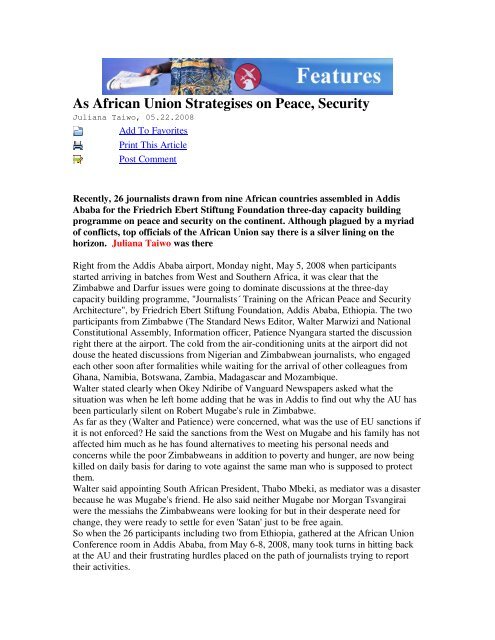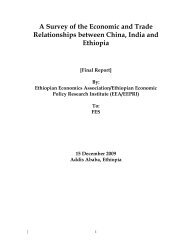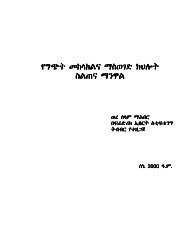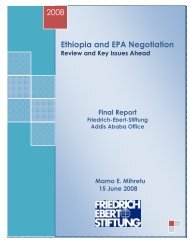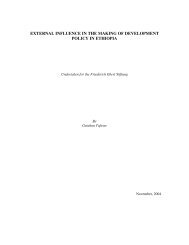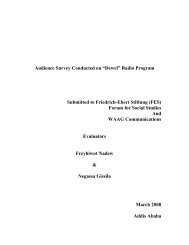As African Union Strategises on Peace, Security - FES Ethiopia
As African Union Strategises on Peace, Security - FES Ethiopia
As African Union Strategises on Peace, Security - FES Ethiopia
You also want an ePaper? Increase the reach of your titles
YUMPU automatically turns print PDFs into web optimized ePapers that Google loves.
<str<strong>on</strong>g>As</str<strong>on</strong>g> <str<strong>on</strong>g>African</str<strong>on</strong>g> <str<strong>on</strong>g>Uni<strong>on</strong></str<strong>on</strong>g> <str<strong>on</strong>g>Strategises</str<strong>on</strong>g> <strong>on</strong> <strong>Peace</strong>, <strong>Security</strong>Juliana Taiwo, 05.22.2008Add To FavoritesPrint This ArticlePost CommentRecently, 26 journalists drawn from nine <str<strong>on</strong>g>African</str<strong>on</strong>g> countries assembled in AddisAbaba for the Friedrich Ebert Stiftung Foundati<strong>on</strong> three-day capacity buildingprogramme <strong>on</strong> peace and security <strong>on</strong> the c<strong>on</strong>tinent. Although plagued by a myriadof c<strong>on</strong>flicts, top officials of the <str<strong>on</strong>g>African</str<strong>on</strong>g> <str<strong>on</strong>g>Uni<strong>on</strong></str<strong>on</strong>g> say there is a silver lining <strong>on</strong> thehoriz<strong>on</strong>. Juliana Taiwo was thereRight from the Addis Ababa airport, M<strong>on</strong>day night, May 5, 2008 when participantsstarted arriving in batches from West and Southern Africa, it was clear that theZimbabwe and Darfur issues were going to dominate discussi<strong>on</strong>s at the three-daycapacity building programme, "Journalists´ Training <strong>on</strong> the <str<strong>on</strong>g>African</str<strong>on</strong>g> <strong>Peace</strong> and <strong>Security</strong>Architecture", by Friedrich Ebert Stiftung Foundati<strong>on</strong>, Addis Ababa, <strong>Ethiopia</strong>. The twoparticipants from Zimbabwe (The Standard News Editor, Walter Marwizi and Nati<strong>on</strong>alC<strong>on</strong>stituti<strong>on</strong>al <str<strong>on</strong>g>As</str<strong>on</strong>g>sembly, Informati<strong>on</strong> officer, Patience Nyangara started the discussi<strong>on</strong>right there at the airport. The cold from the air-c<strong>on</strong>diti<strong>on</strong>ing units at the airport did notdouse the heated discussi<strong>on</strong>s from Nigerian and Zimbabwean journalists, who engagedeach other so<strong>on</strong> after formalities while waiting for the arrival of other colleagues fromGhana, Namibia, Botswana, Zambia, Madagascar and Mozambique.Walter stated clearly when Okey Ndiribe of Vanguard Newspapers asked what thesituati<strong>on</strong> was when he left home adding that he was in Addis to find out why the AU hasbeen particularly silent <strong>on</strong> Robert Mugabe's rule in Zimbabwe.<str<strong>on</strong>g>As</str<strong>on</strong>g> far as they (Walter and Patience) were c<strong>on</strong>cerned, what was the use of EU sancti<strong>on</strong>s ifit is not enforced? He said the sancti<strong>on</strong>s from the West <strong>on</strong> Mugabe and his family has notaffected him much as he has found alternatives to meeting his pers<strong>on</strong>al needs andc<strong>on</strong>cerns while the poor Zimbabweans in additi<strong>on</strong> to poverty and hunger, are now beingkilled <strong>on</strong> daily basis for daring to vote against the same man who is supposed to protectthem.Walter said appointing South <str<strong>on</strong>g>African</str<strong>on</strong>g> President, Thabo Mbeki, as mediator was a disasterbecause he was Mugabe's friend. He also said neither Mugabe nor Morgan Tsvangiraiwere the messiahs the Zimbabweans were looking for but in their desperate need forchange, they were ready to settle for even 'Satan' just to be free again.So when the 26 participants including two from <strong>Ethiopia</strong>, gathered at the <str<strong>on</strong>g>African</str<strong>on</strong>g> <str<strong>on</strong>g>Uni<strong>on</strong></str<strong>on</strong>g>C<strong>on</strong>ference room in Addis Ababa, from May 6-8, 2008, many took turns in hitting backat the AU and their frustrating hurdles placed <strong>on</strong> the path of journalists trying to reporttheir activities.
The AU representatives most of whom happened to be the resource pers<strong>on</strong>s were quick tobeat their chests about the interventi<strong>on</strong>s of the AU in places like Zimbabwe, Somalia,Darfur and recently Comoros but most of the disclosure sounded like French toparticipants as no efforts have been made to publicise them.Mr. Charles Mwaura, an expert <strong>on</strong> Early Warning System with the AU, said it was nottrue that <str<strong>on</strong>g>African</str<strong>on</strong>g> leaders were closing their eyes to the happenings in Zimbabwe. He saidthough the leaders may not openly criticise bad leadership they were working behind thescenes to tell leaders like Mugabe the home truth. He said the success of SADC was as aresult of the backing of the AU Commissi<strong>on</strong> and the <str<strong>on</strong>g>African</str<strong>on</strong>g> leaders engaging of Mugabeat the <str<strong>on</strong>g>African</str<strong>on</strong>g> Leaders Summit in 2007, this he said led to Mugabe engaging in dialoguewith the MDC oppositi<strong>on</strong> leader, Morgan Tsvangirai.He also disclosed that no c<strong>on</strong>flict in the c<strong>on</strong>tinent that has not been foreseen and effortswere made to warn them like that of Rwanda and Zimbabwe.While hitting <strong>on</strong> the <str<strong>on</strong>g>African</str<strong>on</strong>g> media, Mwaura said while the western media markets theirnews with updates at intervals, some <str<strong>on</strong>g>African</str<strong>on</strong>g> media do not update their sites if they haveany at all. This, he said, was resp<strong>on</strong>sible for the poor reportage of the AU and otherdevelopment happening in the c<strong>on</strong>tinent.Mr. El Ghassim Wane, Head of the C<strong>on</strong>flict Management Divisi<strong>on</strong> of the <str<strong>on</strong>g>African</str<strong>on</strong>g> <str<strong>on</strong>g>Uni<strong>on</strong></str<strong>on</strong>g>said the issue of peace and security was a priority for the <str<strong>on</strong>g>African</str<strong>on</strong>g> <str<strong>on</strong>g>Uni<strong>on</strong></str<strong>on</strong>g>. "That is why asa matter of fact in the process of putting together the AU, the leaders made the request toreview the way we are working with the peace and security, look at the instruments thatexisted at that time and see how best we could improve <strong>on</strong> it. It was in that c<strong>on</strong>text that adecisi<strong>on</strong> was made to adopt the protocol establishing the <str<strong>on</strong>g>African</str<strong>on</strong>g> <str<strong>on</strong>g>Uni<strong>on</strong></str<strong>on</strong>g> <strong>Peace</strong> and<strong>Security</strong> Council. And that protocol provided for the establishment of the <strong>Peace</strong> and<strong>Security</strong> Council and also established other key organs to support the peace and <strong>Security</strong>Council in its mandate and include the Panel of the Wise, the <str<strong>on</strong>g>African</str<strong>on</strong>g> Stand-by Force(ASF). But there are also provisi<strong>on</strong>s providing for closer cooperati<strong>on</strong> with Regi<strong>on</strong>alEc<strong>on</strong>omic Communities (RECs) which play increasingly active role in the preventi<strong>on</strong> andmanagement of c<strong>on</strong>flicts. For example, Ec<strong>on</strong>omic Community of West <str<strong>on</strong>g>African</str<strong>on</strong>g> States(ECOWAS), Southern <str<strong>on</strong>g>African</str<strong>on</strong>g> Development Community (SADC), IntergovernmentalAuthority <strong>on</strong> Development (IGAD), Ec<strong>on</strong>omic Community of Central <str<strong>on</strong>g>African</str<strong>on</strong>g> States(ECCAS), Arab Maghreb <str<strong>on</strong>g>Uni<strong>on</strong></str<strong>on</strong>g> (UMA)."I believe we have made progress significantly in putting together what we call the <strong>Peace</strong>and <strong>Security</strong> Architecture which is made up of all these organs. The AU as of today ismore active than it has ever been in dealing with c<strong>on</strong>flicts situati<strong>on</strong>. There is hardly anyc<strong>on</strong>flict situati<strong>on</strong> that is not <strong>on</strong> the agenda of the AU. We sometimes play the lead roles inall these situati<strong>on</strong>s, we support the regi<strong>on</strong>al groupings, we work very closely with theUnited Nati<strong>on</strong>s, we are involved in c<strong>on</strong>flict preventi<strong>on</strong>s, we are involved in c<strong>on</strong>flictsresoluti<strong>on</strong>s, we are involved in post c<strong>on</strong>flicts, we are involved in programmes aimed ataddressing the root causes of c<strong>on</strong>flicts."In spite of the achievements clearly we also do face a number of challenges and <strong>on</strong>e ofthe main c<strong>on</strong>strains has to do with financial resources," he said.On what the AU was doing to address these challenges, Wane said "when it comes tofinance, of course we are trying to address it but within membership of the AU but alsowith our partners. You know the United Nati<strong>on</strong>s <strong>Peace</strong> and <strong>Security</strong> have a role to play.When the European <str<strong>on</strong>g>Uni<strong>on</strong></str<strong>on</strong>g> act <strong>on</strong> the issue of peace and security it is also acting <strong>on</strong>
ehalf of United Nati<strong>on</strong>s and we need clearly a much bigger support from theinternati<strong>on</strong>al community. Already we have received significant support from theEuropean <str<strong>on</strong>g>Uni<strong>on</strong></str<strong>on</strong>g>, United States of America, Japan, Canada, China, from individualmembers of EU and other member states. We are trying to generate enough support tobuild our capacity in terms of human resources and also to increase our resources. Maybeyou are aware that recently, the security council organised meeting <strong>on</strong> relati<strong>on</strong>shipsbetween the UN and regi<strong>on</strong>al organisati<strong>on</strong>s particularly the AU and <strong>on</strong>e of the focus ofthe meeting was precisely to see how best to enhance our resource base, how best toenhance our human resources capacity to make it possible for us to address or deal moreeffectively with the issues facing the c<strong>on</strong>tinent in terms of peace and security", he said.Wane speaking <strong>on</strong> early warning system and why the AU wants to put it in the fr<strong>on</strong>tburner, said "You know <strong>on</strong>e of the main objectives of the AU is preventi<strong>on</strong> of c<strong>on</strong>flictsand that is for two reas<strong>on</strong>s. One of which is that it is always better to prevent than to curebecause many lives would be saved and of course prevent destructi<strong>on</strong> of properties,killing of people. You know all the mayhem that goes with war. Sec<strong>on</strong>d <strong>on</strong>e is that it ischeaper to prevent than to send very expensive peace support operati<strong>on</strong>s. For instance theoperati<strong>on</strong>s in Darfur is a project of over $400 milli<strong>on</strong> a year, that is literally four times thebudget of the AU and it is the same for Somalia. So we have a keen interest in preventingc<strong>on</strong>flicts and that is why in the peace and security council protocol I referred to earlier,there is provisi<strong>on</strong> <strong>on</strong> the establishment of c<strong>on</strong>tinental early warning system that would bemade up of the AU and the Regi<strong>on</strong>al Ec<strong>on</strong>omic Communities (RECs), to make it possiblefor us to anticipate and prevent all c<strong>on</strong>flicts. We have made some progress in putting inplace the key comp<strong>on</strong>ents of the early warning system and again I think ECOWAS forinstance am<strong>on</strong>g the regi<strong>on</strong>al body is clearly the most advanced and we are working veryclosely with them and <strong>on</strong>ce the early warning system is fully in place, it will clearlyenhance our capacity to anticipate and also to put policy opti<strong>on</strong>s to our leadership in theAU so that appropriate preventive acti<strong>on</strong> could be taken but there is still much to be d<strong>on</strong>e.The regi<strong>on</strong>al training, according to Dr. Sabine Fandrych, Resident Representative of <strong>FES</strong>,Addis Ababa office, is subordinate to the objective of creating a regi<strong>on</strong>al dialogue <strong>on</strong>security issues, and specifically aims at raising awareness am<strong>on</strong>g journalists about thestructure, functi<strong>on</strong>ing and implicati<strong>on</strong>s of the new regi<strong>on</strong>al security architecture in theframework of the <str<strong>on</strong>g>African</str<strong>on</strong>g> <str<strong>on</strong>g>Uni<strong>on</strong></str<strong>on</strong>g>; its linkage to other sub-regi<strong>on</strong>al, regi<strong>on</strong>al and globalorganizati<strong>on</strong>s; the opportunities and challenges of c<strong>on</strong>flict preventi<strong>on</strong>, resoluti<strong>on</strong> andpost-c<strong>on</strong>flict peace-building.Fandrych said the workshop was also intended to identify journalists as possiblemultipliers <strong>on</strong> these issues and to improve the networking of journalists in the Southernand West <str<strong>on</strong>g>African</str<strong>on</strong>g> regi<strong>on</strong>."This security architecture encompasses a <strong>Peace</strong> and <strong>Security</strong> Council (PSC) which,according to its founding protocol, is meant to be a 'collective security and early-warningarrangement to facilitate timely and efficient resp<strong>on</strong>se to c<strong>on</strong>flict and crisis situati<strong>on</strong>s inAfrica'. The PSC is to be supported by the Commissi<strong>on</strong> of the AU itself, via the <strong>Peace</strong>and <strong>Security</strong> Commissi<strong>on</strong>er as well as the <strong>Peace</strong> and <strong>Security</strong> Department, a C<strong>on</strong>tinentalEarly Warning System (CEWS), an <str<strong>on</strong>g>African</str<strong>on</strong>g> Standby Force with five regi<strong>on</strong>al brigades aswell as a special fund. Apart from that, a Panel of the Wise and a military staff committeehave been set up to serve as advisory bodies for the PSC in all questi<strong>on</strong>s relating to thepromoti<strong>on</strong> of peace and security in Africa.
"The creati<strong>on</strong> of such a c<strong>on</strong>tinental <str<strong>on</strong>g>African</str<strong>on</strong>g> system for <strong>Peace</strong> and <strong>Security</strong> is a remarkableand innovative development, and it is unequalled even <strong>on</strong> a global scale. However, thereis a l<strong>on</strong>g way to go to make the envisaged structure a functi<strong>on</strong>ing system, both intechnical as well as in political terms. In order for it to functi<strong>on</strong> effectively, closecooperati<strong>on</strong> with the sub-regi<strong>on</strong>al organizati<strong>on</strong>s as well as with the United Nati<strong>on</strong>s andinternati<strong>on</strong>al partners is needed.At the end, it was agreed that <str<strong>on</strong>g>African</str<strong>on</strong>g> journalists need to take interest in the happeningsin the AU, efforts it is making in c<strong>on</strong>flicts preventi<strong>on</strong> and resoluti<strong>on</strong>s and bring it to theknowledge of the beneficiary states as well as the c<strong>on</strong>tinents.While it was agreed that journalistic ethics such as credibility, balance, objectivity,neutrality and morality, must not be compromised, it was also stressed that resp<strong>on</strong>sibleand objective reporting will c<strong>on</strong>tribute to peace and security in the regi<strong>on</strong>.On 22/05/2008, Sabine Fandrych wrote:Dear all,FYISabineDr. Sabine FandrychResident RepresentativeFriedrich-Ebert-StiftungAddis Ababa OfficeTel.: 00251-11- 416 55 70416 55 74416 55 77Fax: 00251-11- 465 53 67P.O. Box 8786Addis Ababa
<strong>Ethiopia</strong>--Juliana TaiwoThisday NewspapersAbuja+234 803 308 0280


